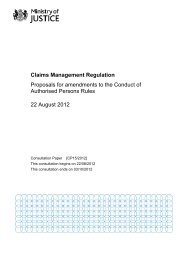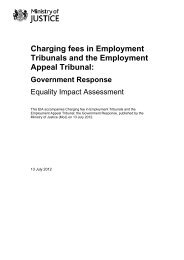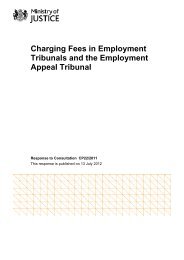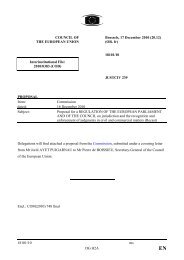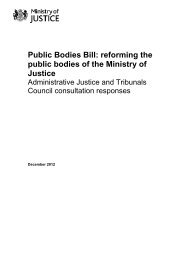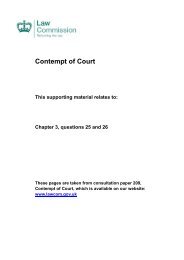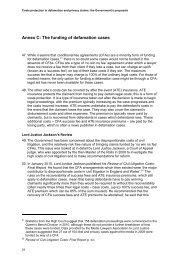Appointments and Diversity 'A Judiciary for the ... - Ministry of Justice
Appointments and Diversity 'A Judiciary for the ... - Ministry of Justice
Appointments and Diversity 'A Judiciary for the ... - Ministry of Justice
You also want an ePaper? Increase the reach of your titles
YUMPU automatically turns print PDFs into web optimized ePapers that Google loves.
<strong>Appointments</strong> <strong>and</strong> <strong>Diversity</strong> A <strong>Judiciary</strong> <strong>for</strong> <strong>the</strong> 21st Century’<br />
Response to public consultation<br />
Question 7: Do you agree that <strong>the</strong> Lord Chancellor should participate on <strong>the</strong><br />
selection panel <strong>for</strong> <strong>the</strong> appointment <strong>of</strong> <strong>the</strong> Lord Chief <strong>Justice</strong> as <strong>the</strong> fifth<br />
member <strong>and</strong> in so doing, lose <strong>the</strong> right to a veto (S 71, 73 <strong>and</strong> 74 <strong>of</strong> CRA)<br />
55. Overall <strong>the</strong>re were 31 responses submitted in relation to this question. Of those, <strong>the</strong>re<br />
were 15 responses that were <strong>for</strong> <strong>the</strong> proposal; while 16 did not advocate <strong>the</strong><br />
proposed change.<br />
56. Those in support believed that <strong>the</strong> involvement <strong>of</strong> <strong>the</strong> Lord Chancellor in <strong>the</strong> selection<br />
panel to appoint <strong>the</strong> Lord Chief <strong>Justice</strong> was preferable to <strong>the</strong> current arrangements<br />
where <strong>the</strong> Lord Chancellor could veto an appointment. There was also a view that <strong>the</strong><br />
important role <strong>the</strong> Lord Chief <strong>Justice</strong> plays in <strong>the</strong> administration <strong>of</strong> justice, justifies this<br />
role <strong>for</strong> <strong>the</strong> Lord Chancellor in exercising his accountability to Parliament <strong>and</strong> <strong>the</strong><br />
public.<br />
57. Of those who did not support <strong>the</strong> proposal, many saw it as a blurring <strong>of</strong> <strong>the</strong> lines<br />
between <strong>the</strong> Executive <strong>and</strong> an independent judiciary, while some were concerned<br />
over <strong>the</strong> potential politicisation <strong>of</strong> <strong>the</strong> appointments process. This latter view was<br />
rein<strong>for</strong>ced by <strong>the</strong> House <strong>of</strong> Lords Constitution Committee, who considered <strong>the</strong><br />
proposal <strong>and</strong> made <strong>the</strong> following observation:<br />
The Lord Chancellor should not sit on selection panels <strong>for</strong> <strong>the</strong> appointment <strong>of</strong> ei<strong>the</strong>r<br />
<strong>the</strong> Lord Chief <strong>Justice</strong> or <strong>the</strong> President <strong>of</strong> <strong>the</strong> Supreme Court. He should be properly<br />
consulted be<strong>for</strong>e <strong>the</strong> start <strong>of</strong> each selection process <strong>and</strong> retain his right <strong>of</strong> veto. Any<br />
closer involvement risks politicising <strong>the</strong> process <strong>and</strong> would undermine <strong>the</strong><br />
independence <strong>of</strong> <strong>the</strong> judiciary.<br />
Paragraph 139, 25th Report <strong>of</strong> Session 2010–12, Judicial <strong>Appointments</strong><br />
58. Our proposals are predicated on <strong>the</strong> view that <strong>the</strong> Executive has a legitimate role to<br />
play in providing accountability to Parliament <strong>and</strong> to <strong>the</strong> public in relation to judicial<br />
appointments. Given <strong>the</strong> significant influence in <strong>the</strong> administration <strong>of</strong> justice that<br />
<strong>the</strong>se two senior judicial roles have, we believe that it is right that <strong>the</strong> Executive has a<br />
direct <strong>and</strong> real role in <strong>the</strong> process, but that this role is properly balanced against<br />
judicial <strong>and</strong> lay input. In <strong>the</strong> current system <strong>the</strong> Lord Chancellor has a right <strong>of</strong> veto at<br />
<strong>the</strong> very end <strong>of</strong> <strong>the</strong> process. This is in practice very problematic to exercise without<br />
raising questions <strong>of</strong> politicisation. There<strong>for</strong>e, we consider that by sitting on <strong>the</strong> panel<br />
<strong>the</strong> Lord Chancellor can ensure that <strong>the</strong> Executive has a proper <strong>and</strong> meaningful<br />
input. There<strong>for</strong>e <strong>the</strong> Lord Chancellor should be a member <strong>of</strong> <strong>the</strong> selection panel<br />
<strong>for</strong> <strong>the</strong> appointment <strong>of</strong> <strong>the</strong> Lord Chief <strong>Justice</strong> <strong>of</strong> Engl<strong>and</strong> <strong>and</strong> Wales. In addition<br />
it is proposed that as a result <strong>the</strong> Lord Chancellor will no longer be able to reject<br />
<strong>the</strong> decision <strong>of</strong> <strong>the</strong> selection panel.<br />
59. We do not consider that this proposal will add a political element to <strong>the</strong><br />
selection or undermine judicial independence as <strong>the</strong> selection will continue to<br />
be based solely on merit.<br />
60. We also believe that <strong>the</strong>re should always be, where possible, a gender <strong>and</strong> an ethnic<br />
mix on <strong>the</strong> selection panel.<br />
15



